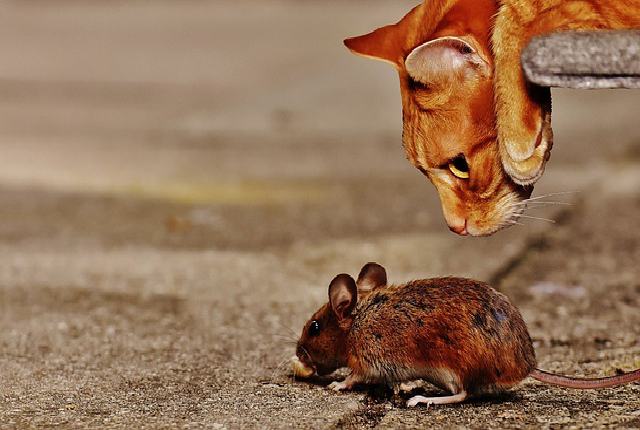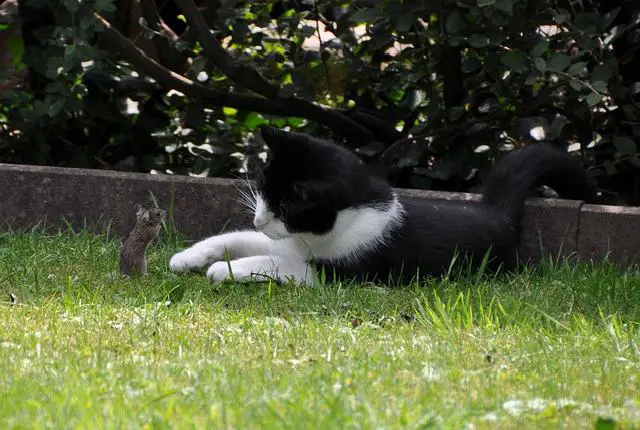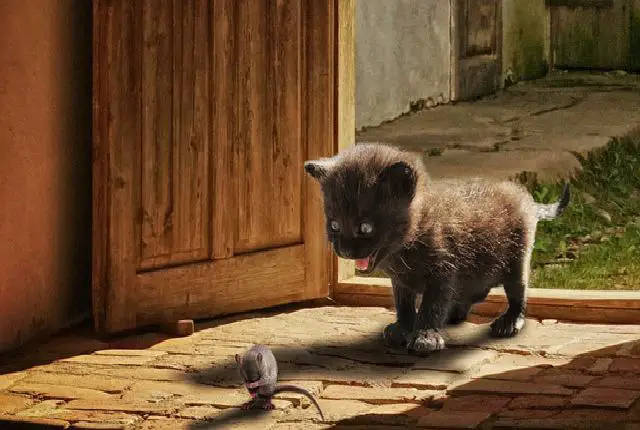How Long Does It Take A Cat To Catch A Mouse?

How long does it take a cat to catch a mouse – This is a popular question people ask a lot and in this article, we will answer it.
We see cats as powerful hunters and one of their popular and most hunted prey is the mouse, from a general point of view mice and cats do not cross paths.
How long does it take a cat to catch a mouse?
It takes a cat less than 5 seconds to catch a mouse, provided the mouse is in sight and close range. There are lots of factors that might influence how long it will take a cat to catch a mouse.
We know cats to be primary hunters of mice, irrespective of the age of a cat. Every cat will always enjoy hunting a mouse, be it indoors or outdoor cats.
However, it is important to note that outdoor cats are better hunters when compared to indoor cats, no matter the age or size of the cat, this is because outdoor cats are more experienced.
It can be said that most outdoor cats use mice as their basic food, while indoor cats are always fed with normal cat food.
Due to experience most outdoor cats are too skillful when it comes to catching a mouse at any level, some outdoor cats already know where to wait for the mouse and when to attack.
Find out more about How to train a cat to stay indoors.
Factors That Affect How Long It Take a Cat to Catch a Mouse?

Here are the factors that might influence how long it takes a cat to catch a mouse, be it indoors or outdoor cats.
Cat Status
The status of the cat is important when considering how long it takes a cat to catch a mouse because the current status of the cat matters most.
When we say the status we are talking about if the cat is an indoor cat or an outdoor cat, and of course, you do not expect an indoor cat to catch a mouse at the same time as an outdoor cat.
It will take an outdoor cat a shorter time to catch a mouse as opposed to indoor cats taking a longer time.
This is because outdoor cats are more experienced, and skillful, and see catching a mouse as an alternative means of survival.
Every outdoor cat has lots of encounters with a mouse, which comes into play the next time they come across a mouse.
An indoor cat with little or no experience will sit to stall a mouse, and right before its eyes, the mouse will escape.
The health status of the cat should also be considered because a healthy cat will move faster to catch a mouse as opposed to a cat that is not feeling too strong.
A sick indoor cat can sit and watch a mouse play political violence in its city, but a sick outdoor cat will make more effort to stop the mouse from playing political violence in its city.
The Breed Of Cat
There are many breeds of cats that can successfully hunt down a mouse, and when considering how long it will take a cat to catch a mouse, we should consider also the breed.
Some breeds of cats are bred to be companions and not for outdoor ventures or hunting, an example is a ragdoll.
You can not compare how long it will take a ragdoll cat to catch a mouse to how long it will take a Siberian cat to hunt down a mouse.
So generally some breeds of cats are just better hunters than others and will take the better hunters a shorter time to catch a mouse than other breeds.
Find out the best breed of cats for catching mice.
The Age Of Cat
The age of the cat matters a lot when considering how long it will take a cat to catch a mouse.
Younger cats might even be afraid of the mouse and would not attack at the proper time, while older cats will attack once to protect their territory.
Of course, you do not expect an 8-week-old cat to attack as a 6 year old cat will attack, because the 8 weeks old cat will take more time to stall a mouse, while the 6 years old cat attack once.
The older the cat, the more experienced the cat, and the more developed the protective instincts.
The older the cat the more fearless the cat will become and this contributes to how long it will take the cat to attack a mouse.
The Distance Between the Cat and Mouse
The distance between the cat and the mouse is a major factor that determines how long it will take a cat to catch a mouse.
Most times the cat has to sneak in just to reduce the distance it will take to pounce on the mouse.
So it is correct to say that the longer the range or distance between the cat and the mouse, the more time it takes the cat to catch the mouse.
The shorter the range or distance between the cat and the mouse, the shorter time it will take the cat to catch the mouse.
If the distance is longer it will take the cat more time to sprint and cover more ground as opposed to when the mouse is in close range.
The Pathway that Leads to the Mouse
Obstacles in the cat’s path can increase the time it takes the cat to catch the mouse.
Sometimes the cat has to run and jump over some objects before it pounces on the mouse and this will definitely extend the time to catch the mouse.
The cat might even miss a mouse because of obstacles on its way.
Therefore, it is right to say that the clearer the pathway of a cat to get to a mouse, the shorter the time to catch the mouse.
On the other hand, the more obstacles that stand in the path of a cat the longer the time it takes the cat to catch the mouse.
Level Of Hunger in the Cat
Just like we know a hungry cat can eat anything around just to stay full, in the same way, the level of hunger in a cat can affect how long it takes the cat to catch a mouse.
In humans, the rate you eat when you’re hungry differs from the rate you see food when you’re not hungry.
A cat that is not hungry might just want to kill a mouse to play with it and as such may not put in more effort to catch the mouse.
A hungry cat that has not seen food for several hours will not delay to pounce on a mouse and start feeding on it immediately.
Cats when hungry are restless and will keep roaming around looking for food, and in the event of seeing a mouse, the cat will attack in less than 5 seconds. This is because the level of hunger is high.
The Vision of the Cat
The more clearly a cat sees a mouse, the shorter time it will take for a cat to catch the mouse.
It will take a cat a long time to catch a mouse when the cat has no unimpeded view of the mouse.
For a cat to pounce on a mouse, first the cat has to get an unrestricted view of the mouse to avoid missing its target.
Read this>>> Why Cats Disappear Without a Trace
The Experience of the Cat With Other Mouse
The experience a cat has the last time catching a mouse might affect how long it will take to catch a mouse.
Let’s say the cat missed its target and got injured, or the cat just had a bad experience in the past when trying to catch a mouse, it will take such a cat a long time to catch the mouse.
Or the last time the cat caught a mouse, the owner was mad at it. This will significantly affect how long it will take the cat to catch the mouse.
Due to a terrible experience, the cat has to sit and wait before attacking, and even during attacking the cat might slow down due to an awful experience.
Size of the Mouse
Most mouse has an intimidating size, and this might put fear in the cat, making it take longer time to catch the mouse.
The bigger the mouse, the longer the time it will take a cat to build the courage to attack the mouse.
A smaller mouse will be easier to attack than a bigger mouse. This will reduce the time it will take the cat to catch the mouse.
At What Age, Should A Cat Hunt A Mouse?
A cat can start hunting a mouse from 7 weeks old, however, this depends on the size of the mouse and that of the cat.
In some cases, a cat will start hunting as soon as it is separated from its mum.
Even though cats that are born outdoors start hunting earlier than indoor cats.
Factors that might influence When a Cat Should Hunt a Mouse

Here are a few factors that might affect the age a cat will start hunting mice.
Cat Status
Cats that are born in the woods or wild will start hunting earlier than indoor cats, this is because most times they join and watch their mum hunt down a mouse.
Outdoor kittens spend more time with their mum learning different hunting skills than indoor cats.
Find out more about the Causes Of Depression In Cats.
Breed
This is to say naturally some breeds will start showing their hunting skills earlier than others.
Some breeds of cats are better hunters than others, and this will be reflected once they are born.
The Size of the Mouse around
The bigger the mouse around, the longer and older it will take a cat to hunt down the mouse.
If there are small breeds of mice around, the cat can start hunting them at a very young stage, as opposed to when there are big mice everywhere.
The bigger the mice around, the more intimidating it will be for a young kitten.
Mother Factor
Some mother cat starts to teach their kittens hunting skills earlier than others.
You can observe this when the mum lays down and uses her tail to swap over her kittens, while the kittens try to catch their mum’s tail by jumping up and down.
Some female cats will catch a mouse and bring it back allowing their kittens to try to hunt down the mouse making sure the mouse doesn’t run away from her kittens.
Some female cat will take their kittens to hunt as early as they start walking well.
The Environment
Some environment allows for kittens to start hunting earlier than others.
An environment with lots of predators will not allow the kittens to start hunting earlier than some environments with fewer predators.
So the safer the environment the earlier the kittens start hunting or learning how to hunt.
Frequently Asked Questions
Can all cats catch mice?
Not all cats can catch mice. Catching mice requires a certain level of hunting skills, persistence, and agility that not all cats possess.
However, many cats have a natural instinct to hunt mice, and some breeds like Siamese, Maine Coon, and Persian cats are better hunters than others.
How do cats catch mice?
Cats are natural predators and use their hunting skills to catch mice.
They use their sharp senses, especially their keen hearing, and vision, to detect even the slightest movements of the mouse.
Once they locate the mouse, they pounce on it using their speed and agility.
What should I do if my cat is not catching mice?
If your cat is not catching mice, there could be several reasons for this.
It could be due to a lack of hunting experience, poor health, or an unsuitable environment.
In such cases, you can try to encourage your cat to hunt by providing opportunities to practice and rewarding them.
Alternatively, you can consult a veterinarian for advice.
Do cats kill mice quickly?
Yes, cats can kill mice quickly. They use their sharp teeth and claws to immobilize and kill the mouse.
However, some cats may prefer to play with the mouse before killing it, which can prolong the process.
Can a cat get sick from catching mice?
Yes, cats can get sick from catching mice. Mice can carry diseases and parasites that can be harmful to cats.
It’s important to keep your cat’s vaccinations and parasite treatments up to date and to monitor their behavior after hunting to ensure they haven’t consumed any infected prey.


![Are Outdoor Cats Happier Than Indoor Cats [Answered] Are Outdoor Cats Happier Than Indoor Cats](https://petcreeks.com/wp-content/uploads/2023/10/pexels-dids-1644602.jpg)
![Why Are Cats Attracted To My House [8 Reasons] Why Are Cats Attracted To My House](https://petcreeks.com/wp-content/uploads/2021/08/Why-Are-Cats-Attracted-To-My-House-768x644.jpg)


![Why Do Outdoor Cats Live Shorter [Answered] Why do outdoor cats live shorter](https://petcreeks.com/wp-content/uploads/2021/02/photo-1558963505-da57e6678065_resize_91.jpg)